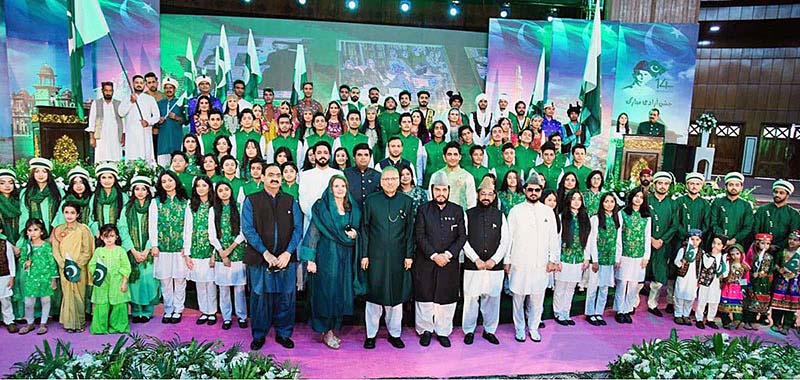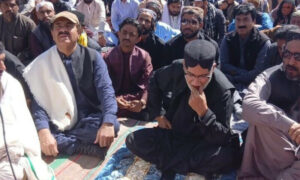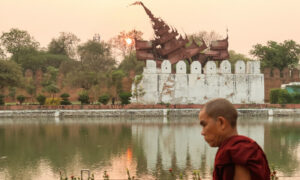Seventy-six years have passed since Pakistan’s inception as an independent nation, guided by the visionary leadership of its founder, Quaid-e-Azam Muhammad Ali Jinnah. The principles of “Unity, Faith, Discipline” were not just mere words but a profound vision for building a strong, prosperous, and harmonious nation. This year, as Pakistan celebrates its 76th Independence Day, it is an opportune moment to reflect on whether these founding principles are still embedded in the country’s social fabric and governance. Has Pakistan managed to uphold the ideals of unity, faith, and discipline in its contemporary context?
Quaid-e-Azam emphasized the paramount importance of unity among the diverse communities that constitute Pakistan. The nation was created to provide a homeland for Muslims where they could enjoy religious, social, and economic freedom. However, over the years, Pakistan has struggled to maintain the unity envisaged by its founder.
Ethnic, linguistic, and sectarian divisions have often led to social and political fragmentation. Regional disparities persist, with certain provinces lagging behind in development indicators. Ethnic and sectarian tensions continue to undermine the unity that Quaid-e-Azam envisioned. To truly honor his vision of unity, Pakistan must work toward fostering inclusivity, celebrating diversity, and addressing the concerns of all its citizens.
The notion of faith, as articulated by Quaid-e-Azam, extended beyond religious belief. It encompassed faith in the principles of justice, democracy, and equal rights. Pakistan was founded as a homeland for Muslims, but it was meant to be a democratic nation where religious freedom was safeguarded for all citizens.
In contemporary Pakistan, religious pluralism has faced challenges, with religious minorities often experiencing discrimination and persecution. Protecting the rights and freedoms of religious minorities is vital to upholding the principle of faith. Pakistan must ensure that its legal and social systems promote religious tolerance and equal rights for all citizens.
Discipline, as advocated by Quaid-e-Azam, was not limited to individual behavior but extended to governance and the rule of law. He envisioned a disciplined and efficient government that would prioritize the welfare of its citizens.
In today’s Pakistan, issues of corruption, inefficiency, and a lack of accountability have plagued the country’s governance systems. Transparency and accountability must be upheld to honor the principle of discipline. Implementing robust mechanisms to combat corruption, improve public services, and ensure the rule of law is crucial for achieving this goal.
As Pakistan marks its 76th Independence Day, the journey toward upholding the principles of unity, faith, and discipline continues. The nation faces formidable challenges, but it also possesses immense potential to realize Quaid-e-Azam’s vision.
Unity can be achieved by fostering inclusivity and addressing regional disparities. Faith can be upheld by safeguarding religious freedom and promoting equal rights for all. Discipline can be instilled by strengthening governance and accountability.
Quaid-e-Azam’s message to the nation remains a guiding light, reminding Pakistan of the path it must follow. The country’s progress and prosperity lie in its ability to embody these principles in its laws, institutions, and collective consciousness. As Pakistan moves forward, it does so with the enduring hope that unity, faith, and discipline will continue to shape its destiny and contribute to a brighter future for all its citizens.
14th August a Day of Celebrations
The day began with a symbolic 31-gun salute in Islamabad, followed by a 21-gun salute in the provincial capitals. Change of guard ceremonies at the mausoleums of Quaid-i-Azam Mohammad Ali Jinnah in Karachi and Allama Iqbal in Lahore added to the grandeur of the celebrations. The Convention Center in Islamabad hosted a flag hoisting ceremony, with President Dr. Arif Alvi as the chief guest, along with other distinguished guests.
President Alvi’s Call for Unity and Progress
During his address at the Convention Center, President Alvi echoed the principles of Pakistan’s founding father, Quaid-i-Azam Mohammad Ali Jinnah, emphasizing “unity, faith, and discipline.” He expressed optimism about Pakistan’s potential to become a developed nation in the near future.
President Alvi called upon political leaders and stakeholders to embrace forgiveness and uphold the core values of Islam. He stressed the importance of unity and urged the nation to break free from nepotism, promote meritocracy, and ensure comprehensive justice, particularly in the socio-economic sphere. He also highlighted the need for greater women’s participation in economic activities and called on the affluent class to support the education of underprivileged children.
In his address, President Alvi paid tribute to the sacrifices of Pakistan’s forefathers, including Sir Syed Ahmed Khan, Allama Iqbal, Quaid-i-Azam Mohammad Ali Jinnah, and Fatima Jinnah. He reaffirmed Pakistan’s commitment to the fight against terrorism and called on the international community to address the issue of Kashmir in accordance with UN Security Council resolutions.
President Alvi expressed gratitude to friendly nations, including Saudi Arabia, the United Arab Emirates, China, Iran, and Turkey, for their support during challenging economic times. He also strongly condemned recent Islamophobic incidents in Western countries.
Shehbaz Sharif’s Reflections
Former Prime Minister Shehbaz Sharif acknowledged Pakistan’s resilience and determination in the face of challenges. He paid tribute to the unsung heroes of the freedom movement and emphasized the importance of unity and action to advance the nation. Shehbaz Sharif called on Pakistanis to make Quaid-i-Azam’s motto of “work, work, and only work” their guiding principle for rebuilding the nation.
Messages of Unity and Solidarity
The military leadership, represented by the Inter-Services Public Relations, called upon the nation to preserve peace, societal harmony, and unity. They pledged to defend the nation’s territorial integrity and serve the people as per their aspirations. The day served as a reminder of the sacrifices made by countless individuals in the pursuit of freedom.
Former Foreign Minister Bilawal Bhutto Zardari emphasized the importance of forging a Pakistan where prosperity is accessible to all, irrespective of their circumstances. He vowed to carry forward the ideology that Pakistan belongs to everyone and that diversity strengthens the nation.
SAFEGUARDING FREEDOM: COAS Gen Asim Munir’s Resounding Message
Amidst the grandeur of the Azadi Parade, marking Pakistan’s 76th Independence Day at the prestigious Pakistan Military Academy in Kakul, Chief of Army Staff (COAS) Gen Asim Munir stood as a beacon of homage to the visionary founding fathers of the nation. In his resounding address, Gen Munir cast a profound light on the essence of Independence Day, firmly rooted in the ideology of the Two Nation Theory. His words reverberated with Pakistan’s unwavering commitment to safeguarding the priceless gift of hard-earned freedom. With eloquence and pride, Gen Munir celebrated the enduring tradition of cherishing the principles of freedom, equality, and the pursuit of happiness that have defined Pakistan’s journey. Acknowledging the challenges Pakistan faces, both internal and external, Gen Munir adopted a defiant stance, quoting the words of the nation’s great Quaid: “There is no power on earth which can undo Pakistan.” He reaffirmed the army’s readiness to safeguard Pakistan’s sovereignty at any cost. The COAS also expressed solidarity with the people of occupied Kashmir, condemning the international community’s inaction regarding Indian actions in the region.
Gen Munir asserted that Pakistan had gained its freedom through immense struggle and knew how to protect it. He called upon Afghanistan to ensure its soil is not used against Pakistan and highlighted the importance of regional cooperation, mentioning strengthened ties with allies such as China, Saudi Arabia, the UAE, Turkiye, Qatar, and Iran. In conclusion, he urged the nation to stand united and serve Pakistan selflessly, reminding all that “Pakistan is our identity, and the rationale to exist – Pakistan hai, to hum hain!”
Tanveer Ali Maken
- This author does not have any more posts.







